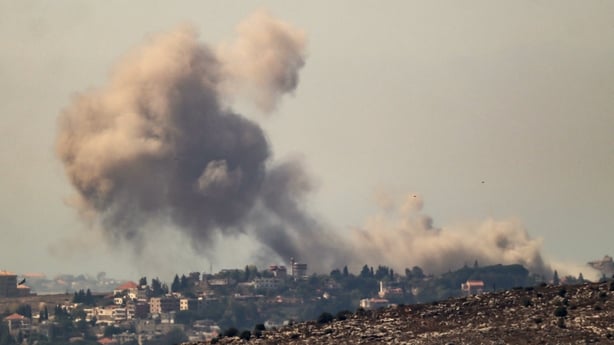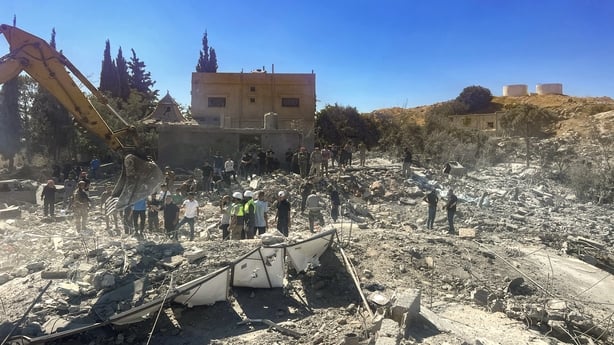Their belongings, their lives, their homes, their dead and their memories.
That is what tens of thousands of internally displaced people have left behind as they flee their homes in southern Lebanon.
Mother-of-three Sara - whose second name is not being published because she is afraid she may be identified - fled the town of Tebnine after it was bombarded last Monday.
Tebnine is where Irish soldiers are stationed at Camp Shamrock.
Speaking to RTÉ's Morning Ireland, Sara described the devastation and heartbreak of being forced from her home.
"I feel very heartbroken. I feel scared. I feel terrified about the future of my kids, about the future of my country. We want peace. We are waiting for solutions," she said, speaking from Beirut.
We need your consent to load this rte-player contentWe use rte-player to manage extra content that can set cookies on your device and collect data about your activity. Please review their details and accept them to load the content.Manage Preferences
"The worst part was leaving my place, my house, my hometown, without knowing what is going to happen there. If we go back, will I find my house, or is it going to be broken down? Our hearts stayed there in Tebnine. Our animals, our pets stayed there," she added.
"We've lost a lot of friends. Families too. For example, my friend, her husband and three children were bombed in their houses a few minutes before we left. Every day now, as we check our phones and the news, we find out that somebody that we know or a friend or a neighbour has passed away too. This is really hard, really, really hard," Sara said.

Sara decided to flee with her family last Monday when Tebnine was bombed.
"They were targeting almost all the villages and Tebnine also. We were listening to the airplanes firing and the sound of the rockets. The children were crying and screaming. We were all screaming because the sound of the rockets and the bombing were horrifying. So, we decided to leave because we did not know what was going to happen," she said.
The journey from Tebnine, which would normally take around two hours, took the family over 24 hours, but it brought them to a safe area seldom bombed in Beirut.
"It's safe for now. It's calm. No air strikes," she said.
Despite Israel’s rejection of international calls for a ceasefire, Sara hopes a solution and peace can be found.
"We hope that both sides will accept the ceasefire … we hope a ceasefire can be approved from both sides as soon as possible," she said.
"We hope that the situation will end as soon as possible. We have to live peacefully, so we are looking for peace. That’s it. We only want peace. We want to live just like normal people with no war, no concerns," she added.

NGO Caritas Lebanon said the numbers leaving southern Lebanon over the past week have surpassed the total of those fleeing the south compared to the past year.
Spokesperson Mazen Moussawer said there is a "huge, massive movement of families fleeing from the south"
"We have had around 105,000 people leaving the south of Lebanon in two days. And this is more or less the same amount of people leaving the south of Lebanon for the last year altogether combined.
"People are arriving to the safe regions with only the basics. They have left their homes quickly and under great stress. Some people are with a wallet and a mobile phone, and this is all they could manage to get out of their homes. It's a huge distress," Mr Moussawer said.
We need your consent to load this rte-player contentWe use rte-player to manage extra content that can set cookies on your device and collect data about your activity. Please review their details and accept them to load the content.Manage Preferences
He added with the humanitarian situation that Caritas is using all its resources to provide services for the massive displacement of people.
"Actually, it is really challenging because most of the people are deprived of everything and the resilience of the Lebanese people after the 2018 economic collapse in the country has impacted greatly the ability for the people, the Lebanese people, and communities who are living in the safer regions," he said.
"They don't have this capacity to bring in people and be able to support them and support their families at the same time. These are challenging times," he added.
Caritas Lebanon is helping thousands of families fleeing their homes in Lebanon as the conflict escalates there. It provides shelter, food, medical care and psychological support.







